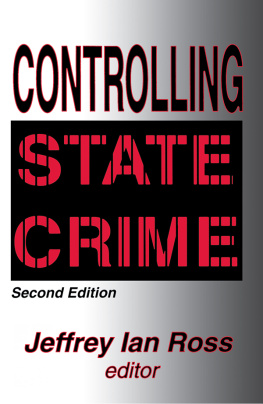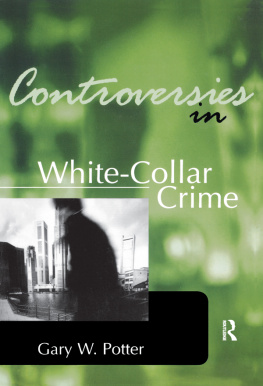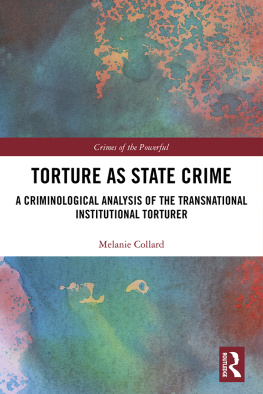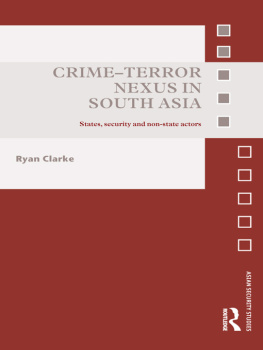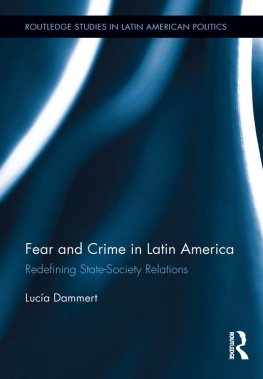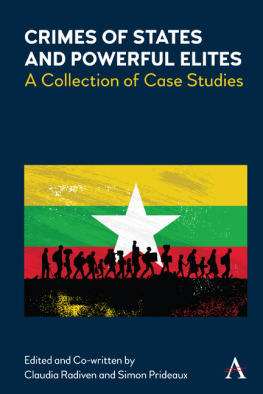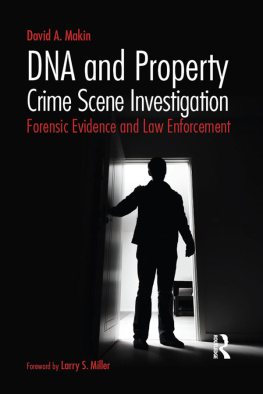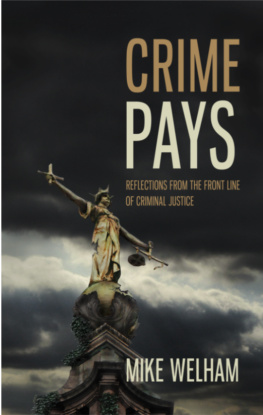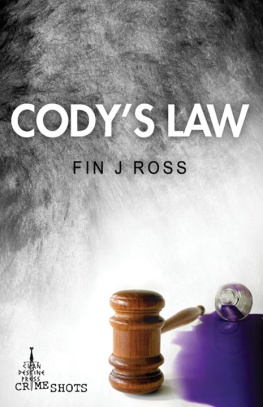Published 2000 by Transaction Publishers
Published 2017 by Routledge
2 Park Square, Milton Park, Abingdon, Oxon 0X14 4RN
711 Third Avenue, New York, NY 10017, USA
Routledge is an imprint of the Taylor & Francis Group, an informa business New material this edition
All rights reserved. No part of this book may be reprinted or reproduced or utilised in any form or by any electronic, mechanical, or other means, now known or hereafter invented, including photocopying and recording, or in any information storage or retrieval system, without permission in writing from the publishers.
Notice:
Product or corporate names may be trademarks or registered trademarks, and are used only for identification and explanation without intent to infringe.
Library of Congress Catalog Number: 00-026701
Library of Congress Cataloging-in-Publication Data
Controlling state crime / Jeffrey Ian Ross, editor.2nd ed.
p.cm.
Includes bibliographical references and index.
ISBN 0-7658-0695-9 (paper : alk. paper)
1. Political crimes and offenses. 2. Political corruption I. Ross, Jeffrey Ian. HV6273 .C66 2000
ISBN 13: 978-0-7658-0695-6 (pbk)
Contents
Austin T. Turk
Jeffrey Ian Ross
Ira Sharkansky
David O. Friedrichs
Pete Gill
Jeffrey Ian Ross
Ken Menz
Natasha J. Cabrera
Kenneth D. Tunnell
Raymond A. Zilinskas
Leon Hurwitz
Barbara M. Yamold
Luis F. Molina
Brian Martin
Jeffrey lan Ross
Introduction to the Second Edition
Almost five years have passed since the original publication of Controlling State Crime. I hoped that the book would stimulate not only scholarly research and debate, but also encourage progressive minded policy makers and practitioners, who work for both governmental and nongovernmental organizations, to at least pause and reflect upon the methods they advocate or use to minimize state transgressions.
With respect to the academic field, not only does work continue in the sub-fields of state crime (i.e., human rights abuses, corruption, etc.), but a number of scholars have published pieces that draw or build upon controlling state crime research (Glasberg and Skidmore, 1998; Israel, 1998; Situ, 1998; Leavitt, 1999; Vaughn, 1999). Not only is this work appearing in the academic journals, but monographs on the subject have appeared. David Friedrichs (1998), for example, edited a two-volume compendium of previously published articles on state crime, and David Kauzlarich and Ron Kramer (1998) applied the concept to the study of American nuclear policy. Needless to say, my academic work has continued, in whole (Ross, 1998, 1999; 2000; Ross et al., 1999) or in part, on the problem of state crime (Ross, 2000).
Unfortunately, state crimes continue to occur. We need look no further than todays headlines to read about Rwanda where government troops massacred countless Hutus and Tutsis, governmental atrocities in Kosovo, at the hands of the Yugoslavian Army, and East Timor where both individuals and property have been decimated, largely perpetrated by the Indonesian military.
In general, the reviews of Controlling State Crime were quite favorable (e.g., Webster, 1995; Israel, 1996; Gould, 1997; Klein, 1997; Stewart, 1997). One reviewer, for instance, called the book the most ambitious and informative book of its kind and suggested that Controlling State Crime breaks new ground conceptualizing state crime from an international perspective (Klein, p. 103). And another commentator said that I found a sizeable gap in the work of criminologists. He also suggested that the book goes beyond appreciation of crime and pursue[s] some vision of social justice (Israel, p. 171) and Ross book is an important step in introducing the state into the crime prevention literature as an offender rather than simply as a victim, mediator or punisher of crime (Israel, p. 172). Other reviewers were simply descriptive (e.g., Seabury, 1995), lukewarm (Weiss, 1995), or downright hostile (Cohen, 1996).
My work and thinking on state crime have been aided by a variety of persons, some of whom are friends, including Bruce Arrigo, Gregg Barak, Dorothy Bracey, Henry Brownstein, Natasha Cabrera, Jeff Ferrell, David Friedrichs, Ted Robert Gurr, Donna Hale, Victor Kappeler, David Kauzlarich, Peter Kraska, Otwin Marenin, Gary Marx, William McDonald, Stephen Richards, Larry Travis, Kenneth Tunnell, Austin Turk, and Mike Vaughn. Not only have they provided me with valuable advice, but they have been very collegial.
Although I was glad that the first edition of the book was published as part of Frank P. Williams III and Marilyn McShanes well received series Current Issues in Criminal Justice, for Garland Publishing, the cost of the book was prohibitive, allowing mainly only libraries and diehard scholars to afford its purchase. Im happy that Irving Louis Horowitz, Distinguished Professor, Rutgers University, and Editorial Director, Transaction Publishers adopted the book, made it available in soft cover with a price that is in line with competing works, and within the reach of most students and other consumers. This broader dissemination of the book will expand the debate and increase awareness of the problem of state crime and the difficulties and opportunities for its control.
Jeffrey Ian Ross
References
Cohen, Stanley, (1996) Review of Controlling State Crime, British Journal of Sociology, Vol. 47, pp. 733-734.
Friedrichs, David, ed. (1998) State Crime, Aldershot, England: Ashgate, Vols. I and II.
Glasberg, Davita S. and Dan L. Skidmore, (1998) The Role of the State in the Criminogenesis of Corporate Crime, Social Science Quarterly, Vol. 79, No. 1, pp. 110
Gould, Larry A, (1997) Review of Controlling State Crime, The Social Science JournalNoX. 34, No. 2, pp. 263-265.
Israel, Mark, (1996) Review of Controlling State Crime Vol. 2, No. 2, pp. 168-173.
Israel, Mark, (1998) Crimes of StateVictimization of South African Political Exiles in the United Kingdom, Crime, Law and Social Change Vol. 29, No. 1, pp. 1-29.
Kauzlarich, David and Ronald Kramer, (1998) Crimes of the American Nuclear State, Boston: Northeastern University Press.
Klein, Lloyd, (1997) Review of Controlling State Crime, Vol. 21, No. 1, March, pp. 103-104.
Leavitt, G. (1999). Criminological Theory as an Art Form, Crime and Delinquency, Vol. 45, No. 3, pp. 389-399.
Ross, Jeffrey Ian, (1998) Situating the Academic Study of Controlling State Crime, Crime, Law and Social Change Vol. 29, No. 4, December, pp. 331-340.
Ross, Jeffrey Ian, (1999) State (Organized) Crime, Its Control, Unintended Consequences, and Suggestions for Future Research, in Stan Einstein and Menachim Amir (eds.) Organized Crime: Uncertainties and Dilemmas Chicago, IL: Office of International Criminal Justice, pp. 407-422.
Ross, Jeffrey Ian, (2000) Making News of Police Violence Westport, CT: Praeger Publishers.
Ross, Jeffrey Ian, et al. (1999) The State of State Crime Research: A Commentary,

